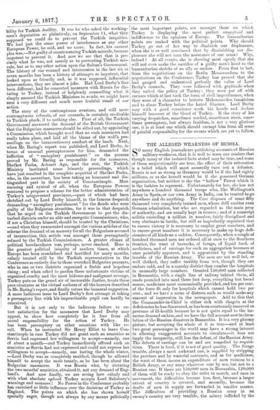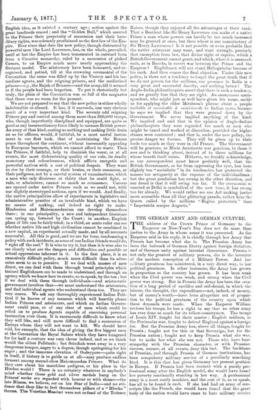THE ALLEGED WEAKNESS OF RUSSIA.
SO many English journals are publishing accounts of Russian. military weakness, that it is well to warn our readers that though many of the isolated facts stated may be true, and some of them unquestionably are true, the effect of their reiteration is a belief which will most assuredly turn out a delusion. Russia is not as strong as Germany would be if she had eighty millions, or as she herself would be if she possessed German organisation, but neither is she the " hollow " Power which it is the fashion to represent. Unfortunately for her, she has not anywhere a hundred thousand troops who, like Wellington's Army in Spain, or our own Army in India, can be trusted to go anywhere and do anything. The Czar disposes of some fifty thousand very completely trained men, whose drill excites even German admiration, but who are regarded as the main prop of authority, and are usually kept in reserve ; and of a conscript militia exceeding a million in number, fairly disciplined and very obstinate in battle, but still so imperfectly organised that to ensure victory it is necessary to employ great numbers, and to ensure great numbers it is necessary to make up huge defi- ciencies of all kinds on a sudden. Consequently, when a couple of hundred thousand men are ordered all at once to the Southern frontier, the want of barracks, of forage, of liquid food, of medicines, and of carriage for such an aggregation becomes at once painfully apparent, and is aggravated by the standing trouble of the Russian Army. The men are not well fed, or well clothed, they suffer terribly from wet, though they can endure cold, and in a marshy district they cumber the hospitals in unusually large numbers. Granted 150,000 men collected in Bessarabia, with a single line of railway behind them, all roads pounded into mud three feet deep, everything but bread scarce, medicines most economically provided, and ten per cent. of the force fit only for hospitals which cannot hold two per cent., and we have a scene of distress such as would make any amount of impression in the newspapers. Add to this that the Commander-in-Chief is either sick with chagrin at the deficiencies he has discovered, or has been courteously removed on pretence of ill-health because he is not quite equal to the im- mense demand on him, and we have the full account now in circu- lation of the Russian disasters in Bessarabia. It is a very gloomy picture, but accepting the whole of it as true—and at least two great personages in the world may have a strong interest in allowing exaggerated accounts to circulate—it does not imply the incapacity, still less the defeat, of the Russian Army. The defects of carriage can be and are remedied by requisi- tions. There is food, if it is not of good quality. The forage trouble, always a most awkward one, is supplied by stripping the province and by wasteful contracts, and as for medicines, the want of them means an expenditure of men ruinous to a British Army, or any army whatever sent by sea, but not to a Russian one. If there are 150,000 men in Bessarabia, 120,000 of them will be ready to obey the order to march, and once in movement, the difficulties become less, first, because a larger extent of country is covered, and secondly, because the drafts of men in supply are forwarded in smaller masses. The difficulties of providing a Russian army in an enemy's country are very terrible, the misery inflicted by the
English idea, as it existed a century ago ; action against the great landlords ceased ; and the "Golden Bull," which assured to the Princes their perpetuity of succession and their here- ditary rights, was solemnly proclaimed as the first law of the Em- pire. Ever since that date the new policy, though distrusted by powerful men like Lord Lawrence, has, on the whole, prevailed, until at last the Empire has been transmuted in outward form from a Cmsarist monarchy, ruled by a succession of picked Cream, to an Empire much more nearly approaching the German model. The aristocracy have been honoured, and re- cognised, and petted, till at the crowning ceremonial of the Coronation the scene was filled up by the Viceroy and his im- mediate agents, and the reigning princes, and the mediatised princes—e.g., the Rajah of Benares—and the army, till it seemed as if the people had been forgotten. To put it rhetorically but truly, the plain of the Coronation was so full of the magnates that there was no room for the peasant.
We are not prepared to say that the new policy is either wholly indefensible or absurd. It has, if it succeeds, one very obvious merit of a very important kind. The seventy odd reigning Princes pay and control among them more than 300,000 troops, who, though imperfectly disciplined and equipped, are quite as good as any insurrectionary force likely to menace British power. An army of that kind, costing us nothing and making little drain on us for officers, would, if faithful, be a most useful instru- ment in our first task, that of maintaining the Roman peace throughout the continent, without incessantly appealing to European bayonets, which we cannot afford to waste. Then the Princes, if faithful, help to diminish the worst, or at all events, the most disheartening quality of our rule, its deadly monotony and colourlessness, which afflicts energetic and powerful natives with a sort of political despair. They want to rise by their courage, or their brains, or their resources, or their pedigrees, not by a careful system of examinations, which a man who only discovers at thirty that he could fight, or rule, or administer, cannot so much as commence. Careers are opened under native Princes such as we could not, with our slightly stereotyped notions, open if we would. And finally, the native principalities allow of experiments in legislative and administrative practice of an invaluable kind, which we have no means of making, and indeed no right to make. Hindooism and Mahommedanism can develop themselves there ; in one principality, a new and independent literature can spring up, fostered by the Court ; in another, English plans of life can be fairly tried; in a third, an acute ruler can see whether native life and high civilisation cannot be combined in a new capital, an experiment actually made, and by all accounts successful. All this is good, and we are far from condemning a policy with such incidents, as some of our Indian friends would do, "right off the reel." It is wise to try it, but then it is wise also to see clearly what are the dangers and difficulties and possible or actual oppressions inherent in it. In the first place, it is an excessively difficult policy, much more difficult than its advo- cates seem to us to perceive. If we deal with masses of men direct, we can deal with them through broad principles which trained Englishmen can be made to understand, and through an agency which we know how to create, so to speak, by the ton ; but if we deal with them through individuals—and aristocratic government involves that—we must understand the aristocrats, and find individual agents who understand them too. They are very scarce. We ask any thoroughly experienced Indian Poli- tical if he knows of any measure which will heartily please Indian Princes and aristocrats, and which an Indian Govern- ment could pass, or of any class of men which could be relied on to produce Agents capable of exercising personal fascination over them. It is enormously difficult to know what they will like, and still more difficult to find a succession of Envoys whom they will not want to kill. We should have slid, for example, that the idea of giving the five biggest men at the Coronation the Royal Salute which they have hungered for for half a century was very clever indeed, and so we think would the oldest Politicals ; but Scindiah went away in a very dangerous temper, angry to a degree, though apologising for his anger ; and the immense elevation of Oodeypore—quite right in itself, if history is to guide us at all—may produce endless ferment among second-class Mahommedan Princes. What do they care about his matchless pedigree, or his place in the Hindoo world? There is no certainty whatever in anybody's mind whether those gold and silver medals hung on the Princes necks are regarded with honour or with shame—the late Nizam, we believe, sat on his Star of India—and no evi- denoe that they like to feel themselves pillars of a " Mlecha " throne. The Venetian lefassimi were not so fond of the Tedesco Kaiser, though they enjoyed all the advantages of their rank. That a Resident like Sir Henry Lawrence can make of a native Prince a man whose powers can hardly be too much increased may be granted at once, bat then where is our manufactory of Sir Henry Lawrences Is it not possible or even probable that the native aristocrat may want, and want strongly, precisely that exemption from law, that divine right of caprice, which a British Government cannot grant, and which, when it is assumed. ends as in Baroda, in covert war between the Prince and the Empress Englishmen will not stand Heliogabalue because of his rank. And then comes the final objection. Under this new policy, is there not a tendency to forget the great truth that if we do not govern for the millions, our presence in India is a very great and successful dacoity, and nothing better? The Anglo-India philanthropists assert that there is such a tendency, and we greatly fear that they are right. An anonymous corre- spondent, who might just as well have given his name, scolds us for applying the elder Mirabeau's phrase about a people taillable et corve'eable a misericorde to Indian ryots, because he says we implied that they were ground down by the Government. We never implied anything of the kind. We implied and said that in the opinion of Anglo-Indian philanthropists they were regarded too much as men who might be taxed and worked at discretion, provided the higher classes were contented ; and that is, under the new policy, the precise danger we foresee. They will be given up to their lords too much as they were in old France. The Government will be gracious, as Marie Antoinette was gracious, to those it sees and is thinking about, instead of to those millions for whose benefit itself exists. Hitherto, we frankly acknowledge, as our correspondent must know perfectly well, that the British Government, so far from oppressing the ryot, has been slightly too " socialistic " in its tendencies, has protected the masses too arrogantly at the expense of the individualisms; but the great pendulum has swung in the other direction, and our dread is that it will swing too far. If the ceremonial as enacted at Delhi is symbolical of the new tone, it has swung too far already. We would rather see one Act making justice more accessible than all that glittering parade, rather hear the Queen called by the millions "Regina protectrix " than " Imperatrix semper Augusta."










































 Previous page
Previous page